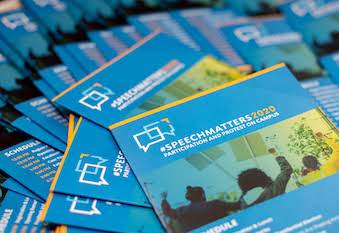Programs
Issue 2 – Updated July 2022
Engaging Student Voters
In this installment of our Speech Spotlight series, we focus on a key component of civic engagement on campus: voting. Despite great improvement in 2018, college-aged voters have some of the lowest turnout numbers of any age group. We’ll explore what prevents students from voting and how your institution can incentivize civic participation by making the voting process as smooth as possible for your students.
While we recognize that many schools’ efforts to create a more civically engaged student body extend far beyond the ballot box, this piece focuses on efforts dedicated specifically to helping and encouraging students to vote.
Why it Matters

Thoughts from Nancy Thomas (February 2020)
Director, Institute for Democracy & Higher Education, Tufts University
Speaking of Voting…
Over the past few months, I have traveled to campuses and higher education conferences and talked with hundreds of academics. I always ask, what opportunities and challenges do you see facing your campus during the 2020 election season? Not surprisingly, they have mixed feelings about the next 10 months.
They are enthusiastic about what they view as an increase in student political interest, issue activism, and voter mobilization efforts. Last year, we published voting rates from our flagship project, the National Study of Learning, Voting, and Engagement (NSLVE), indicating that in 2018, the college and university student voting rate more than doubled from the previous midterm, a jump from 19% to 40%.
They are deeply concerned, however, about misinformation and challenges to evidence-based standards, extreme political polarization and divisive rhetoric, and the rise of hate speech and white nationalism on campus. Public institutions face so-called “campus free speech” laws, some of which mandate sanctions for student protesters or require “neutrality,” undermining institutional academic freedom. Institutional leaders worry about these volatile conditions and how to handle highly visible incidents. Professors express concern that they lack the skills to manage conflict in the classroom. And they worry that they will be surreptitiously recorded, and their out-of-context words will be disseminated through social media or turned over to a self-appointed watch-dog group. Many educators say they are “keeping their heads down” and avoiding anything political.
How do educators encourage voting under these political conditions?
Educating for participation in democracy is not simply transactional, easily addressed by registration drives or transporting students to polling locations. Our research on highly politically engaged campuses suggests that voting reflects a complex set of campus norms, behaviors, practices, and structures conducive to political learning and participation. We found that the most significant attribute of politically engaged campuses is pervasive political discussions across differences of ideology and identity.
These are not serendipitous, water-cooler conversations. Students learn how to frame issues and consider them from multiple perspectives. They check facts and challenge misinformation. They examine differences based on positionality, culture, and lived experiences. They practice passionate advocacy while exploring common ground. Faculty reinforce these habits by approaching learning through skillfully facilitated classroom discussions, while staff use collaborative approaches to running student programs and departments.
The good news is that educators and students are excited and engaged in this election season, providing colleges and universities opportunities to teach about the more pressing social and political tensions in public life and to realize their civic missions. The bad news is that many educators are intimidated by the toxic environment, potentially inhibiting opportunities for student learning. These are matters of academic freedom, which educators should invoke to provide students
with opportunities to study and discuss democratic principles, practices, and policy debates. When educators educate for democracy, students learn. And they vote.
To subscribe to our Speech Spotlight series, contact FreeSpeechCenter@uci.edu.


